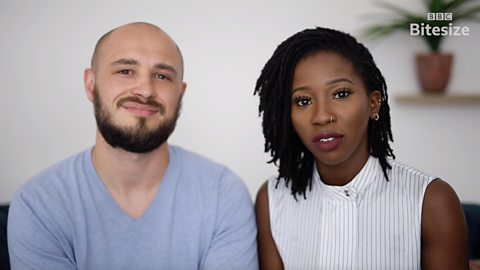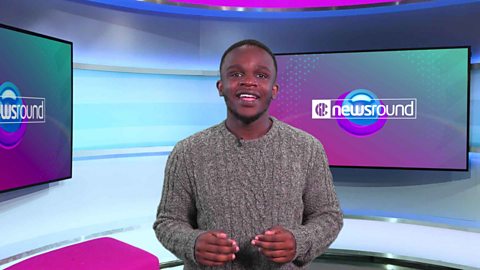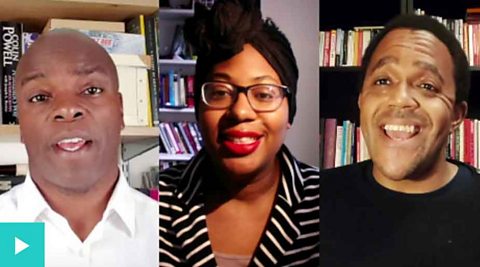Hearing racist language can stop you in your tracks, whether it's directed at you personally, a friend or relative that youãre with, or someone in your class at school. It's never, ever acceptable.
Offensive words and terms can be directed against people of all nationalities. They could also be used deliberately to insult somebody's religion, or how they identify culturally - for example, in the languages and traditions they share with others.
If you find yourself in a situation where racist language is being used, it's understandable that you may not know the best way to react. A lot depends on who it is that's using the offensive terms. If it's a stranger, it's not advisable to get directly involved and you should never put yourself in a situation that feels unsafe or threatening. But if you hear a friend, family member, or a fellow pupil use language that makes you uncomfortable, there are some strategies you can follow which will help bring a discussion about it into the open.
ôÕÑ¿¿ìë½òæØ°àŠ¢Ö Bitesize has spoken to Kate Mills, a former teacher, who is an education worker with Show Racism the Red Card. The charity offers resources in tackling racism in our society, and works closely with professional footballers to keep the anti-racism message circulating. Based in Wales, her role includes visiting school pupils of all ages, as well as adults, to provide lessons and workshops on how we can deal with racist behaviour in our everyday lives. This is her advice.
Rephrasing the terms we hear
ãSomething we get a lot,ã said Kate, ãis someone saying, ãmy nan, sheãs not racist, butãÎã.ã
Older generations in our families may use offensive language to describe people from different nationalities and cultures that they have long thought acceptable, perhaps without even realising it is racist. Kate continued: ãThen people say they donãt want to start a fight in the family, but what can they do?ã

This is where an action known as rephrasing can be used to challenge such language.
If an older member of the family described a black person who lived in their street using unacceptable language, when you reply, and if you feel safe in doing so, you could simply refer to that person as black.
Kate describes this as one of the more subtle ways of challenging racist terms. Switching the unacceptable word that someone else used to the correct one provides what is known as a social cue - a spoken or non-spoken message that we give when responding to others. In a situation like this, Kate says: ãItãs giving a cue without making someone feel they have something to be defensive about.ã

Questioning and informing
Part of Kate and the charityãs work is to find out where racism comes from. It could be through a lack of education, or a lack of understanding.
If you hear someone you know make a racist statement, you may want to question why they said it - again, provided you feel safe and comfortable in doing so.
ãWe find there is a lot of prejudice around refugees and immigrants,ã said Kate. ãThere is a lot of misinformation around it. For example, you may hear someone say that ãimmigrants are stealing our jobsã.
ãIn questioning, we would say something like, ãOh, how do you steal a job?ã and then unravel it from there.ã
The advice given by the charity is to go from a questioning stage to an informing one. This could involve explaining the benefits of people from other countries bringing their skills to the UK. An example Kate gives in Wales is that one in three of the countryãs doctors are from outside the UK. It can help to challenge stereotypes people have formed in their minds.
She added: ãAs a charity, we would never label somebody as a racist. We would label behaviour as racist. Weãve found that if you have these conversations with people, they are much more likely to change.ã

Withdrawing and reporting
You won't always want to challenge racist language directly. The situation could make you feel so unsafe or uncomfortable that all you want to do is walk away - and that's absolutely fine. Withdraw from what's happening and report what you've heard to a teacher, parent or another adult you trust.
Kate said: ãThis is a form of challenge in itself. If you are the target of racist abuse, or a bystander who overhears racist abuse, itãs OK to leave that situation.
ãYour safety and your mental health is important first. You have a duty to yourself, and you can pass on your concerns to others."

Withdrawing from a situation and reporting it can also apply when you hear someone you know, either a friend or family member, make racist comments on a regular basis and you donãt feel itãs safe to challenge it.
Kate explained: "When it's undercutting comments from friends or family, it can be quite difficult to know how to challenge this, when youãre not sure how theyãre going to react."
She added: ãFor the majority of young people, those situations can be most difficult as itãs the drip-drip effect.
ãOnline, you can report something straight away and withdraw from that platform if you need to, you have a way of switching it off. Itãs not like that in everyday life.ã
If you are unsure about anything related to racism and racist language, remember that you don't have to keep it to yourself. You can always speak to an adult you trust, at school or in your family, about your concerns.
You can find out more about racism and how it can form in this Newsround article.
If you are concerned for your mental health as an effect of racism, Bitesize also has this article to offer support and advice.
If you have experienced any racist bullying, anti-bullying campaigner Alex Holmes shares his advice here.
This article was published in October 2020 and updated in August 2024
The Adanna and David Family: the books we use to talk about racism to our children
Adanna and David explain how they use books to talk to their boys about race and diversity.

CôÕÑ¿¿ìë½òæØ°àŠ¢Ö's Newsround presenter talks about growing up in a Ghanaian household in Milton Keynes

